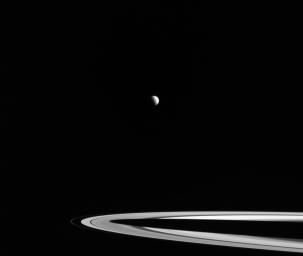
|
Rings Interrupted
- Click the image above for a larger view
- Full-Res JPEG (1020 x 863) (20.1 kB)
- Full-Res TIFF (1020 x 863) (331.6 kB)
Caption:
Distant Titan, its northern hemisphere drenched in the sunlight of late spring, hangs above Saturn's rings. What might at first glance look like a gap between the rings and the planet is actually Saturn's shadow. During most of Saturn's long year, the projection of the planet's shadow extends well beyond the edge of the A ring. But, with summer solstice fast approaching, the Sun is now higher in Saturn's sky and most of Saturn's A ring is completely shadow-free.
This view looks toward the sunlit side of the rings from about 3 degrees above the ring plane. The image was taken in red light with NASA's Cassini spacecraft wide-angle camera on Jan. 26, 2016.
The view was obtained at a distance of approximately 1.8 million miles (2.9 million kilometers) from Titan and at a Sun-Titan-spacecraft, or phase, angle of 84 degrees. Image scale on Titan is 109 miles (176 kilometers) per pixel.
Background Info:
The Cassini mission is a cooperative project of NASA, ESA (the European Space Agency) and the Italian Space Agency. The Jet Propulsion Laboratory, a division of the California Institute of Technology in Pasadena, manages the mission for NASA's Science Mission Directorate, Washington. The Cassini orbiter and its two onboard cameras were designed, developed and assembled at JPL. The imaging operations center is based at the Space Science Institute in Boulder, Colorado.
For more information about the Cassini-Huygens mission visit http://saturn.jpl.nasa.gov and http://www.nasa.gov/cassini . The Cassini imaging team homepage is at http://ciclops.org .
Cataloging Keywords:
| Name | Value | Additional Values |
|---|---|---|
| Target | Titan | A Ring, Saturn Rings |
| System | Saturn | |
| Target Type | Satellite | Ring |
| Mission | Cassini-Huygens | |
| Instrument Host | Cassini Orbiter | |
| Host Type | Orbiter | |
| Instrument | Imaging Science Subsystem (ISS) | |
| Detector | Wide Angle Camera | |
| Extra Keywords | Gap, Grayscale, Shadow, Visual | |
| Acquisition Date | ||
| Release Date | 2016-06-06 | |
| Date in Caption | 2016-01-26 | |
| Image Credit | NASA/JPL-Caltech/Space Science Institute | |
| Source | photojournal.jpl.nasa.gov/catalog/PIA20484 | |
| Identifier | PIA20484 | |
